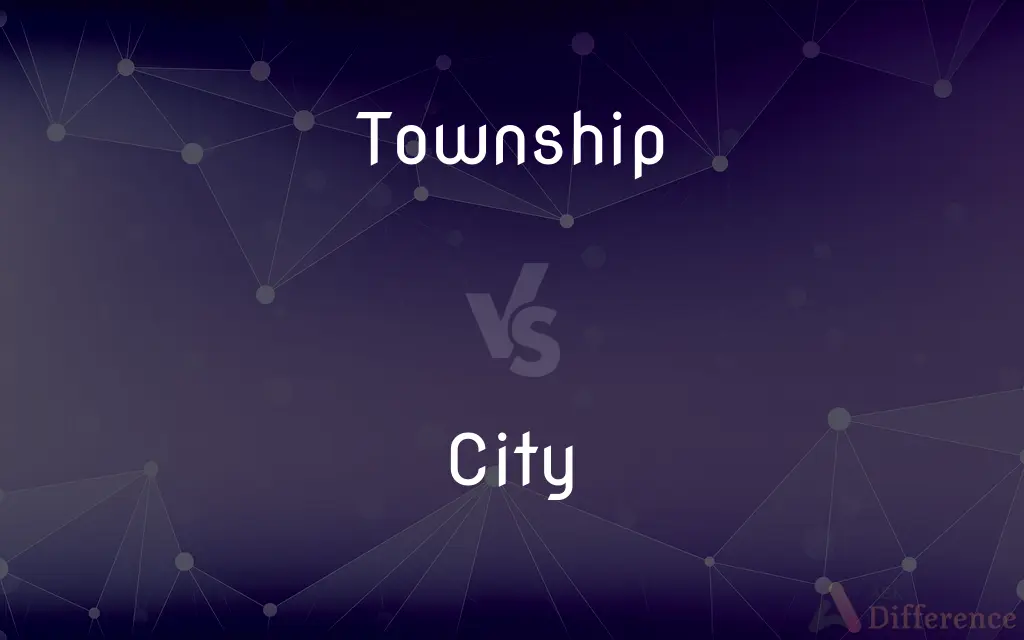Township vs. City — What's the Difference?
By Tayyaba Rehman — Updated on November 3, 2023
A township is a subdivision of a county with limited self-governance, while a city is a large, densely populated area with full municipal powers.

Difference Between Township and City
Table of Contents
ADVERTISEMENT
Key Differences
Townships represent local government entities that are smaller than cities and usually exist in more rural or suburban areas. They have a less complex administrative structure and often focus on providing basic services. In contrast, cities are dense, urban centers with more expansive governmental powers and a higher population. They provide comprehensive services and infrastructure, often including public transportation and emergency services.
Cities are recognized as centers of economic, cultural, and social activities, usually with diverse populations and significant commercial development. Townships, on the other hand, might maintain more of a community-oriented identity, possibly with less diversity and smaller-scale economies. Both function under the broader umbrella of state law but have different roles in the governance structure.
In a township, governance may involve a board of trustees and limited jurisdiction over zoning and local ordinances. Cities have a city council or mayor with broader legislative authority, including taxation, law enforcement, and educational policies. The scope of governance in cities necessitates a larger bureaucratic structure compared to townships.
Townships typically cover rural to suburban regions, providing a governance framework where a smaller population does not necessitate city-level services. Cities are economic hubs with extensive infrastructure to support residential, business, and cultural needs. The transition from a township to a city often follows population growth and urbanization.
Comparison Chart
Governance
Limited self-governance, usually a board of trustees.
Full municipal powers, often governed by a mayor or city council.
ADVERTISEMENT
Population Density
Lower, often rural or suburban.
Higher, typically urban areas.
Area Coverage
Can be more expansive with fewer people.
Densely populated, often with a defined metropolitan area.
Services Provided
Basic services such as road maintenance.
Comprehensive services, including public transportation and emergency services.
Level of Autonomy
Less autonomy with more direct state oversight.
More autonomy with the ability to enact local laws.
Compare with Definitions
Township
A subdivision of a county with administrative functions.
The township meeting discussed the new zoning laws.
City
In legal terms, an incorporated area with its own government.
The city has its own police and fire departments.
Township
A geographical area falling outside of larger urban districts.
Our township is known for its annual fair.
City
A hub for business, cultural, and educational facilities.
The city's museum district attracts tourists from around the world.
Township
In some U.S. states, a town equivalent entity for local governance.
She canvassed for votes in her township.
City
A municipality granted certain powers by the state.
The city council approved the new development plan.
Township
In historical contexts, a division of land in colonial America.
The historical township's borders were defined in the 1700s.
City
An urban area distinguished from towns or villages by size, population, or status.
They moved to the city for more job opportunities.
Township
An area with its own local government.
The township trustee oversees local public works.
City
A city is a large human settlement. It can be defined as a permanent and densely settled place with administratively defined boundaries whose members work primarily on non-agricultural tasks.
Township
A township is some kind of human settlement or administrative subdivision, with its meaning varying in different countries. While the term is occasionally associated with an urban area, this tends to be an exception to the rule.
City
A large town
One of Italy's most beautiful cities
The city council
Township
A subdivision of a county in most northeast and Midwest US states, having the status of a unit of local government with varying governmental powers.
City
Short for City of London
Township
A public land surveying unit of 36 sections or 36 square miles.
City
A center of population, commerce, and culture; a town of significant size and importance.
Township
An ancient administrative division of a large parish in England.
City
An incorporated municipality in the United States with definite boundaries and legal powers set forth in a charter granted by the state.
Township
A suburb or city in South Africa formerly designated by the government as a predominantly black residential area.
City
A Canadian municipality of high rank, usually determined by population but varying by province.
Township
The territory of a town.
City
A large incorporated town in Great Britain, usually the seat of a bishop, with its title conferred by the Crown.
Township
A subdivision of a county.
City
The inhabitants of a city considered as a group.
Township
An area set aside for nonwhite occupation.
City
An ancient Greek city-state.
Township
A nonwhite (usually subeconomic) area attached to a city.
City
(Slang) Used in combination as an intensive
The playing field was mud city after the big rain.
Township
A small town.
City
City The financial and commercial center of London. Used with the.
Township
The district or territory of a town.
City
A large settlement, bigger than a town; sometimes with a specific legal definition, depending on the place.
São Paulo is the largest city in South America.
Township
In surveys of the public land of the United States, a division of territory six miles square, containing 36 sections.
City
(UK) A settlement granted special status by royal charter or letters patent; traditionally, a settlement with a cathedral regardless of size.
Township
In Canada, one of the subdivisions of a county.
City
(Australia) The central business district; downtown.
I'm going into the city today to do some shopping.
Township
An administrative division of a county;
The town is responsible for snow removal
City
(slang) A large amount of something used after the noun.
It’s video game city in here!
City
A large town.
City
A corporate town; in the United States, a town or collective body of inhabitants, incorporated and governed by a mayor and aldermen or a city council consisting of a board of aldermen and a common council; in Great Britain, a town corporate, which is or has been the seat of a bishop, or the capital of his see.
A city is a town incorporated; which is, or has been, the see of a bishop; and though the bishopric has been dissolved, as at Westminster, it yet remaineth a city.
When Gorges constituted York a city, he of course meant it to be the seat of a bishop, for the word city has no other meaning in English law.
City
The collective body of citizens, or inhabitants of a city.
City
Of or pertaining to a city.
City
A large and densely populated urban area; may include several independent administrative districts;
Ancient Troy was a great city
City
An incorporated administrative district established by state charter;
The city raised the tax rate
City
People living in a large densely populated municipality;
The city voted for Republicans in 1994
City
A large populated area with structured governance and services.
New York City is bustling with activity.
Common Curiosities
Is a township or city higher in the administrative hierarchy?
A city typically has a higher level of self-governance compared to a township.
Can a township become a city?
Yes, a township can become a city through a process that typically involves meeting certain population and infrastructure criteria.
What defines a township?
A township is often a municipal subdivision within a county with its own local government and administrative duties.
Are townships considered rural?
They can be, but they may also include suburban areas.
What distinguishes a city from a township?
Cities have a larger population, more complex governance, and offer more comprehensive services.
How does funding differ between townships and cities?
Funding mechanisms can differ, with cities often having more revenue options like city taxes.
How is a mayor different from a township trustee?
A mayor is the head of a city government with broader executive powers than a township trustee.
Can urban areas be part of a township?
Yes, depending on the state, some urban areas can be part of a township.
What is a township trustee?
A township trustee is an elected official responsible for managing the affairs of the township.
What are the responsibilities of a township government?
They include road maintenance, local ordinance enforcement, and managing public lands.
What kind of services does a city provide that a township does not?
A city provides more extensive services, including public transportation, emergency services, and city planning.
Does a city have more autonomy than a township?
Generally, yes, cities have more autonomy and regulatory powers.
Is a city's population always larger than a township's?
Not always, but typically cities have a higher population density than townships.
Are all townships part of a larger city?
No, townships can exist independently of cities.
Do townships have their own schools and police?
This varies by state, but some townships may have their own schools and contract out for police services.
Share Your Discovery

Previous Comparison
Hitwoman vs. Hitman
Next Comparison
Rover vs. RowerAuthor Spotlight
Written by
Tayyaba RehmanTayyaba Rehman is a distinguished writer, currently serving as a primary contributor to askdifference.com. As a researcher in semantics and etymology, Tayyaba's passion for the complexity of languages and their distinctions has found a perfect home on the platform. Tayyaba delves into the intricacies of language, distinguishing between commonly confused words and phrases, thereby providing clarity for readers worldwide.














































